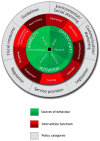Theories for interventions to reduce physical and verbal abuse: A mixed methods review of the health and social care literature to inform future maternity care
- PMID: 37093790
- PMCID: PMC10124898
- DOI: 10.1371/journal.pgph.0001594
Theories for interventions to reduce physical and verbal abuse: A mixed methods review of the health and social care literature to inform future maternity care
Abstract
Despite global attention, physical and verbal abuse remains prevalent in maternity and newborn healthcare. We aimed to establish theoretical principles for interventions to reduce such abuse. We undertook a mixed methods systematic review of health and social care literature (MEDLINE, SocINDEX, Global Index Medicus, CINAHL, Cochrane Library, Sept 29th 2020 and March 22nd 2022: no date or language restrictions). Papers that included theory were analysed narratively. Those with suitable outcome measures were meta-analysed. We used convergence results synthesis to integrate findings. In September 2020, 193 papers were retained (17,628 hits). 154 provided theoretical explanations; 38 were controlled studies. The update generated 39 studies (2695 hits), plus five from reference lists (12 controlled studies). A wide range of explicit and implicit theories were proposed. Eleven non-maternity controlled studies could be meta-analysed, but only for physical restraint, showing little intervention effect. Most interventions were multi-component. Synthesis suggests that a combination of systems level and behavioural change models might be effective. The maternity intervention studies could all be mapped to this approach. Two particular adverse contexts emerged; social normalisation of violence across the socio-ecological system, especially for 'othered' groups; and the belief that mistreatment is necessary to minimise clinical harm. The ethos and therefore the expression of mistreatment at each level of the system is moderated by the individuals who enact the system, through what they feel they can control, what is socially normal, and what benefits them in that context. Interventions to reduce verbal and physical abuse in maternity care should be locally tailored, and informed by theories encompassing all socio-ecological levels, and the psychological and emotional responses of individuals working within them. Attention should be paid to social normalisation of violence against 'othered' groups, and to the belief that intrapartum maternal mistreatment can optimise safe outcomes.
Copyright: © 2023 Downe et al. This is an open access article distributed under the terms of the Creative Commons Attribution License, which permits unrestricted use, distribution, and reproduction in any medium, provided the original author and source are credited.
Conflict of interest statement
The authors have declared that no competing interests exist.
Figures












References
-
- Bowser D, Hill K. Exploring evidence for disrespect and abuse in facility-based childbirth report of a landscape analysis. 2010 https://cdn2.sph.harvard.edu/wp-content/uploads/sites/32/2014/05/Explori... Feb 3rd 2023
-
- Bohren MA, Vazquez Corona M, Odiase OJ, Wilson AN, Sudhinaraset M, Diamond-Smith N, et al.. (2022) Strategies to reduce stigma and discrimination in sexual and reproductive healthcare settings: A mixed-methods systematic review. PLOS Glob Public Health 2(6): e0000582. doi: 10.1371/journal.pgph.0000582 - DOI - PMC - PubMed
Publication types
Grants and funding
LinkOut - more resources
Full Text Sources
